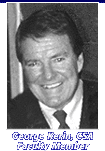
|
|


The
CSA Board of Standards
CSA Code of Professional Responsibility
You may view the entire text of the code and
the Acknowledgement and Acceptance form
directly from our Web site.
| We encourage you to view and print the code and the acceptance form in PDF format: | |
| CSA
Code of Professional Responsibility Download (118k) |
Acknowledgement
and Acceptance of the CSA Code of Professional Responsibility Download (101k) |
|
|
|
|
Today, the emphasis is on market conduct and compliance in most areas of accounting and legal services, health and social services, life and health insurance sales, and the investment arena. The concern, for those involved in such endeavors, centers on establishing trust, servicing client needs and creating appropriate recommendations, as well as building long-term client relationships. When trust, needs-based selling, and long-standing relationships exist, there are few, if any, complaints regarding ethical misconduct. A professional’s success is greatly enhanced by high ethical standards. Many approaches are available for developing high ethical standards; for example, Rotary International, the world’s oldest and largest service club, encourages its members to apply The Four-Way Test to everything they think, say or do. Rotary claims that The Four-Way Test can be applied profitably in relations with others in the home, the community, and business, as well as national and international life. It is particularly helpful in its application to proposed plans, policies, statements, and advertising in business and the professions. The Four-Way Test is simple yet effective. It asks:
If you were to apply that uncomplicated test to everything you think, say or do, an intimate knowledge of a code of ethics would be unnecessary, because you would, implicitly, be in conformance with it. Anyone may put the test into practice. All of the approaches to high ethical standards have honesty as their cornerstone. Many consider the old expression “Honesty is the best policy” as trite and out of date. The general public and the writers of the several codes of professional responsibility do not think so. Earl Nightingale once considered the issue of honesty, and then he said:
A recent research project conducted by the Indiana University Graduate School of Business and the General Agents and Managers Association (GAMA) found that successful life insurance field officers believe that the most important traits in new recruits are ethical conduct and honesty. Notwithstanding that finding, the number of people who think that financial services companies possess high ethical standards has fallen from 50% to 24% over the past 28 years. We have a duty to do what we can to improve that image; we owe it to the communities we serve, and we owe it to ourselves. You are the representative of your company in dealing with seniors. Your high ethical standards are the key to establishing trust and building long-term relationships with your senior clients. As a Certified Senior Advisor (CSA) ®, you are called on to ask prospects and clients several very personal questions and to make some confidential financial inquiries. Your senior prospects and clients will only answer those questions completely and honestly if they believe that you are ethical (which includes keeping the answers in confidence), forthright and well-intentioned. The best way to establish, maintain or enhance your ethical standards is to live by a code of ethics. Practicing high ethics, or responsibility, is the task of everyone in our business — from the home offices to the independent producer, from the nursinghome owner to the health-care provider, and from the manager of a brokerage firm to the salesman. The CSA Board of Standards has established CSA Code of Professional Responsibility (Code) for you to live by. The Code embodies six fundamental principles of ethical conduct. They are:
Although you have been provided with the CSA Code of Professional Responsibility that you are required to practice, if you want to remain a Certified Senior Advisor (CSA) ®, you need to do more. Public demand, marketplace complexities, and a firm regulatory environment require strict adherence to market conduct and compliance regulations. You must combine high ethical conduct with diligent compliance. Just as ethical conduct alone is not enough, compliance alone is not enough either; compliance regulations present only a bare minimum. A particular act or deed may be legal but not necessarily ethical. You can make compliance a competitive advantage by serving prospects and clients in a highly ethical fashion, with full compliance.
We invite you to review the Letter from the President. |
|||||
![]()
Download the FREE Acrobat Reader
The Society of Certified Senior Advisors is dedicated to providing continuing
education that addresses new developments and research concerning seniors.
![]()
Top
of Page
![]()
HOME
![]() ABOUT US
ABOUT US ![]() CERTIFICATION
CERTIFICATION ![]() PUBLICATIONS
PUBLICATIONS
MEMBERS
![]() CSA
SUPPLY CATALOG
CSA
SUPPLY CATALOG
Society of Certified
Senior Advisors | 1777 S. Bellaire St., #230 | Denver
CO 80222
ph: 303.757.2323 | toll-free: 1.800.653.1785 |
fax: 303.757.7677 | e-mail: [email protected]
*Statistical information based on data from U.S. Bureau of the Census
Web Site Services by
Max Media Solutions
Copyright © 2000-2004 Society of Certified Senior Advisors.
All rights reserved.